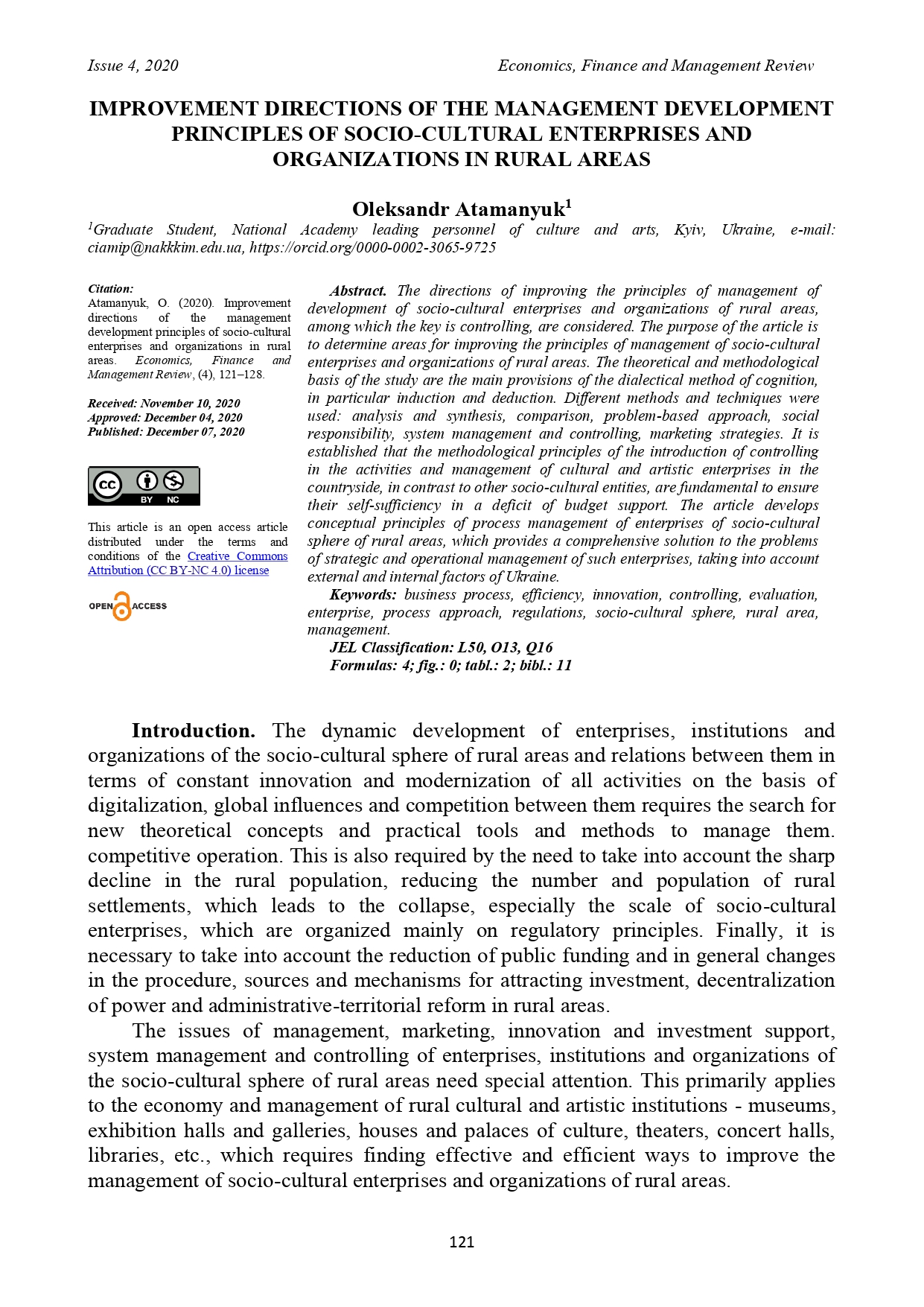IMPROVEMENT DIRECTIONS OF THE MANAGEMENT DEVELOPMENT PRINCIPLES OF SOCIO-CULTURAL ENTERPRISES AND ORGANIZATIONS IN RURAL AREAS
Keywords:
business process, efficiency, innovation, evaluation, enterprise, process approach, regulations, socio-cultural sphere, rural area, managementAbstract
The directions of improving the principles of management of development of socio-cultural enterprises and organizations of rural areas, among which the key is controlling, are considered. The purpose of the article is to determine areas for improving the principles of management of socio-cultural enterprises and organizations of rural areas. The theoretical and methodological basis of the study are the main provisions of the dialectical method of cognition, in particular induction and deduction. Different methods and techniques were used: analysis and synthesis, comparison, problem-based approach, social responsibility, system management and controlling, marketing strategies. It is established that the methodological principles of the introduction of controlling in the activities and management of cultural and artistic enterprises in the countryside, in contrast to other socio-cultural entities, are fundamental to ensure their self-sufficiency in a deficit of budget support. The article develops conceptual principles of process management of enterprises of socio-cultural sphere of rural areas, which provides a comprehensive solution to the problems of strategic and operational management of such enterprises, taking into account external and internal factors of Ukraine.
Downloads
References
Zorina O. Organization of controlling in Ukraine: questions of theory and practice // Bulletin of the Nat. University "Lviv. Polytechnic ". Management. and entrepreneurship in Ukraine: stages of formation and problems. divorce 2009. No 647. P. 350–355.
Shilo V., Ilyina S., Mensha I. The role of controlling in the enterprise management system // Bulletin of the Khmelnytsky National University. 2011. No 1. P. 45–50.
Nagula N. The mechanism of controlling as a tool of modern enterprise management // Scientific works of NUHT. 2010. No 35. P. 197–201.
Gudzinsky O., Aksentyuk M., Demenina O. Controlling in the management system: [monograph]. Inst of Preparation. state staff. employment services of Ukraine. K.: IPKDOZU, 2009. 225 p.
Govorushko T., Kronikovsky D. Problematic aspects of controlling in Ukraine // Economic Journal XXI. 2011. No 1/2. P. 51–53.
Brokhun N. Analysis of the effectiveness of implementation and operation of the controlling system at enterprises // Bulletin of the ZhSTU. 2012. № 4(62). P. 35-38.
Bukreeva D. Complex system of indicators of controlling efficiency - a tool for monitoring the effectiveness of controlling in an industrial enterprise // Development of accounting, analysis and control in terms of integration processes: materials intern. scientific-practical conf., (1-2 August, 2014). К. КЕНЦ, 2014. P. 24-25.
Holovatska S. Accounting and analytical tools of controlling in the management of enterprise costs: a monograph. Lviv: LTEU Publishing House, 2017. 360 p.
Redzyuk E. Investment management: a textbook. Kyiv: NACCKiM, 2014. 288 p.
Shcherbyna-Yakovleva O., Svitailo N. Management of socio-cultural activities as a direction of scientific and technological knowledge. Part 1. Didactics, logic, methodology. Textbook. Deposited manuscript. Sumy, SSU Repository, 2018. 207 p.
Tyvonchuk S., Kostyuk R. Institutional support of innovation in the agricultural sector // Economics of agro-industrial complex. 2014. No 8. P. 68-75.

Downloads
Published
How to Cite
Issue
Section
License

This work is licensed under a Creative Commons Attribution-NonCommercial 4.0 International License.




